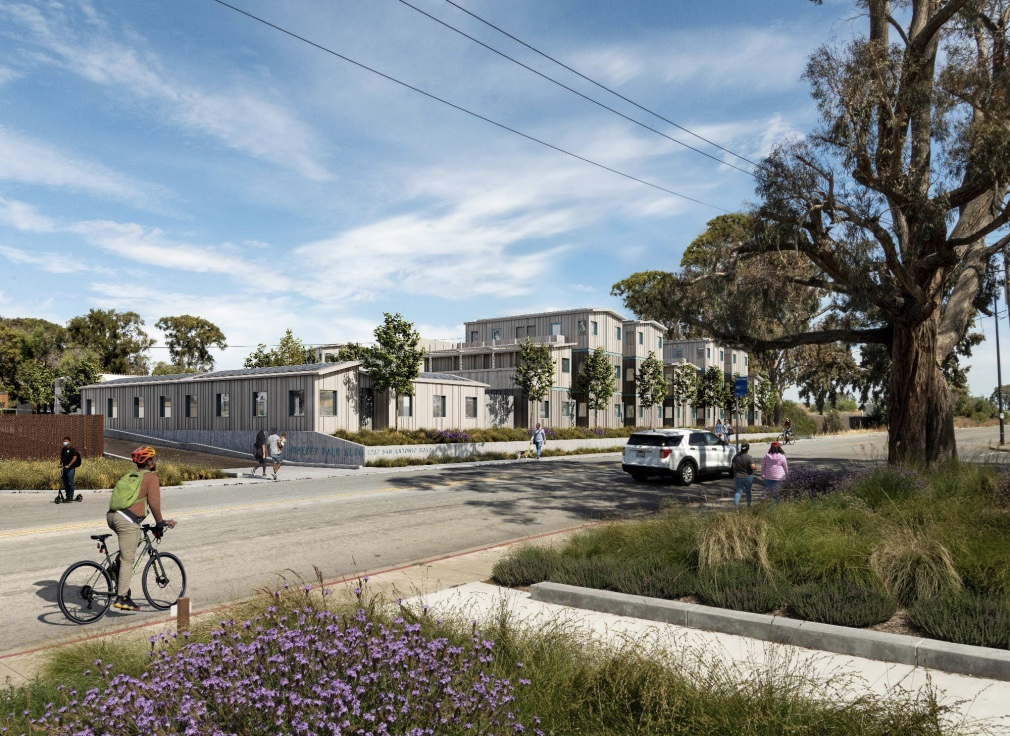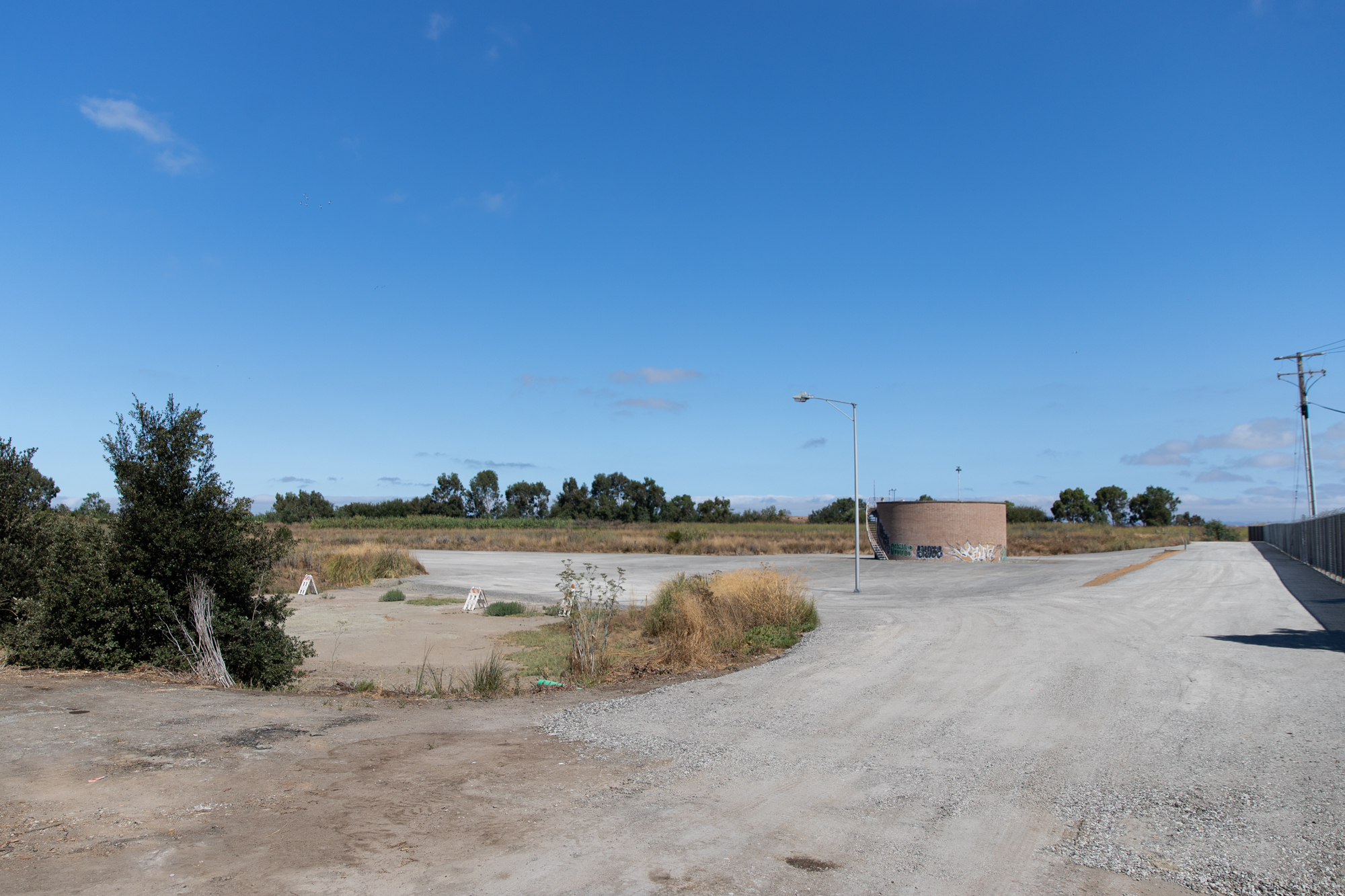More than a year after the Palo Alto City Council first floated the idea of building a shelter for unhoused individuals near the Baylands, its vision is on the cusp of becoming reality thanks to a $26.6 million grant.
Gov. Gavin Newsom announced on Wednesday that Palo Alto's proposed shelter will be one of 35 projects to receive funding in the latest round of Project Homekey, a grant program administered by the Department of Housing and Community Development that supports efforts to build dwellings for the unhoused, whether through conversion of hotels or through construction of new developments.
Palo Alto's project is modeled after 100-unit modular development that Mountain View had constructed on Leghorn Street, a project that Newsom highlighted in 2021 as a "shining example" of a local solution to the homeless crisis. Under the council's recent revisions, the development will be a three-story structure with 88 dwellings, 64 for singles and couples and 24 for families. It would be constructed at 1237 San Antonio Road, a site formerly occupied by the Los Altos Treatment Plant.
The facility will consist of modular dwellings with solar panels on the roofs. It will also include offices for case management, a structure for communal space and dining facilities.
While the council has consistently and enthusiastically supported the project, its fate remained uncertain after Palo Alto was not included in the prior rounds of grant distribution. Despite the setback, city officials continued to negotiate with LifeMoves, the nonprofit that will operate the facility, and Santa Clara County, which will help cover some of the operating costs.
The council reaffirmed its support for the development on Aug. 15, when it voted 6-1, with Greg Tanaka dissenting, to approve a "standard agreement" with the state for the grant funding. The agreement requires the city to complete construction of the shelter within 12 months. Residents will stay in the transitional housing complex for between 90 and 120 days and for no more than 180 days, according to a report from the city.
Mayor Pat Burt called the award of the grant "a great development and one that we expected and have been working on for over a year now."
"The city showed a great deal of commitment and resourcefulness to identify a site, overcome any impediments and take actions that we needed to take to really validate that the site would work and to be prepared," Burt said in an interview. "We've been in anticipation of this grant, we've been doing a lot of preparation work so that we can move forward as quickly as possible."
The Baylands project is part of a constellation of projects that the city is now pursuing to address its gaping shortage of affordable housing. Burt pointed to the recent proposal from the nonprofit developer Charities Housing to build 129 apartments targeting individuals with low incomes at 3001 El Camino Real, the former site of Mike's Bikes. Eden Housing is advancing its own plan for 50 below-market-rate apartments at 525 Charleston Road, while Alta Housing is now completing construction of Wilton Court, which includes 59 apartments for low-income residents and individuals with disabilities. These projects, Burt suggested, will offer residents of the Baylands facility feasible options for permanent housing.
"I have already had discussions with the Charities Housing folks and they're getting introduced to LifeMoves and starting to explore how they might complement each other," Burt said.
Newsom announced the latest round of awards at a Los Angeles press conference. He noted that Project Homekey has already funded more than 200 projects across the state, including more than 12,500 permanent and interim dwellings for people exiting homelessness since it was introduced two years ago. The program, he said, "is changing lives across the state."
"Homekey's groundbreaking success is a model for the nation, showing that we can make real progress on ending homelessness in months, not years," Newsom said in a statement.
The Palo Alto award is part of a package of $694 million grants that Newsom announced Wednesday, funds that will create about 2,500 dwellings. Assembly member Marc Berman, D-Menlo Park, lauded the grant, and said he looks forward to "seeing a Homekey project in every city in the state."
"Building on the success of the Mountain View Homekey project, the Palo Alto shelter will provide urgently needed services that will help transition Palo Altans out of homelessness," Berman said in a statement. "Operated by LifeMoves, these shelters exemplify how local and state government, housing providers, nonprofits, and the community can successfully work together to help address our homelessness crisis."
Palo Alto council members also emphasized earlier this month the continued importance of building transitional housing. Council member Greer Stone pointed to the substantial number of homeless individuals in Santa Clara County and the city's failure to build any shelters. Council member Alison Cormack, who participated in the point-in-time count of unhoused individuals earlier this year, noted that the homeless population in the county went up by 3% this year.
"I think we've all shown our unwavering support for this project and continue to be supportive of it," Stone said at the Aug. 15 meeting.
Even before the Wednesday announcement, LifeMoves has been working to finalize its agreements with the city, wrap up design work and hire a construction company. Jo Price, vice president for real estate and operations for LifeMoves, said the nonprofit has selected XL Construction, which had worked on the Mountain View shelter and on the 240-unit Navigation Center in Redwood City now under construction.
Tanaka was the only council member to vote against approving the project, citing the high costs of building and operating a shelter. He objected to the fact that Palo Alto's facility would cost about $200,000 per door while the Mountain View development cost $130,000 per door. Price attributed the gap to the fact that Palo Alto's facility includes larger units for families and that it would have more restrooms.
"With it costing way more than it is in our neighboring community, it doesn't seem right," Tanaka said. "I think we should scale back to have the same cost."




Comments